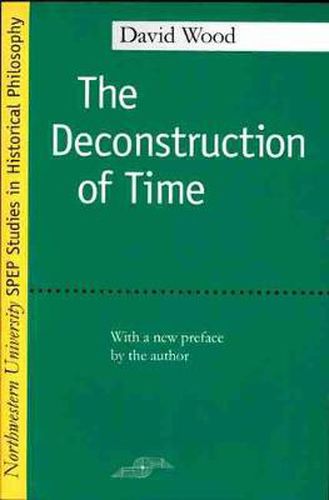Readings Newsletter
Become a Readings Member to make your shopping experience even easier.
Sign in or sign up for free!
You’re not far away from qualifying for FREE standard shipping within Australia
You’ve qualified for FREE standard shipping within Australia
The cart is loading…






Originally published in 1989, The Deconstruction of Time was the first to examine what has become the fundamental, even defining, project in continental philosophy: double rethinking. Begun by Husserl, this area of inquiry partially seeks to rethink time in terms of our experience of it; a second aspect of the project, begun by Heidegger, is an attempt to rethink our selves (and philosophy itself) in terms of the results of that initial rethinking. Using Derrida as his point of reference, Wood undertakes a critical reformulation of the project through discussions of Nietzsche, Husserl, and Heidegger. The Deconstruction of Time is a critical history of the development of the topic, but also more: it includes important contributions to the phenomenology of time (as
cosmic,
dialectical,
phenomenal,
and so on) and a rereading of Derrida himself. In recent years considerations of Wood’s themes have grown in import. The Deconstruction of Time is a groundbreaking study of a topic that has become vital in continental philosophy.
$9.00 standard shipping within Australia
FREE standard shipping within Australia for orders over $100.00
Express & International shipping calculated at checkout
Stock availability can be subject to change without notice. We recommend calling the shop or contacting our online team to check availability of low stock items. Please see our Shopping Online page for more details.
Originally published in 1989, The Deconstruction of Time was the first to examine what has become the fundamental, even defining, project in continental philosophy: double rethinking. Begun by Husserl, this area of inquiry partially seeks to rethink time in terms of our experience of it; a second aspect of the project, begun by Heidegger, is an attempt to rethink our selves (and philosophy itself) in terms of the results of that initial rethinking. Using Derrida as his point of reference, Wood undertakes a critical reformulation of the project through discussions of Nietzsche, Husserl, and Heidegger. The Deconstruction of Time is a critical history of the development of the topic, but also more: it includes important contributions to the phenomenology of time (as
cosmic,
dialectical,
phenomenal,
and so on) and a rereading of Derrida himself. In recent years considerations of Wood’s themes have grown in import. The Deconstruction of Time is a groundbreaking study of a topic that has become vital in continental philosophy.